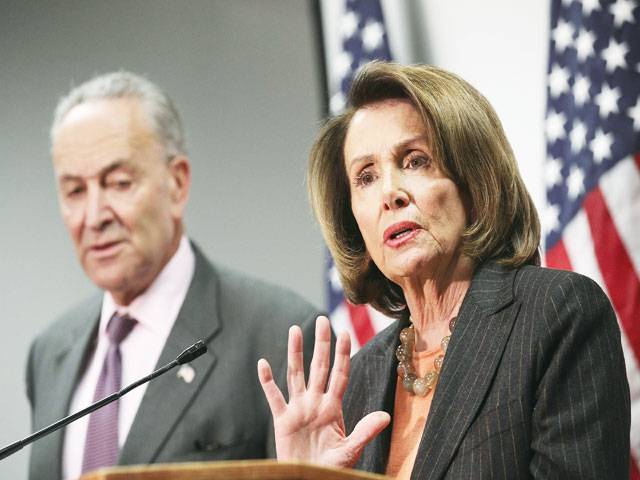WASHINGTON - President Donald Trump clashed with Democratic leaders in dramatic fashion Tuesday, heaping pressure on the US Congress to craft a compromise on federal spending or face a crippling government shutdown in 10 days.
Hours after the president suggested a spending deal with Democrats may be impossible, House Minority Leader Nancy Pelosi and top Senate Democrat Chuck Schumer pulled out of a scheduled White House meeting with Trump that they said would be fruitless.
"Given that the president doesn't see a deal between Democrats and the White House, we believe the best path forward is to continue negotiating with our Republican counterparts in Congress instead," the pair said in a statement.
The rare public rejection of White House talks ratcheted up tensions in Washington over a must-pass spending bill by a December 8 deadline, and served as a stinging rebuke to a president who often mocks his rivals on Twitter.
It also muddied the waters just as Trump was headed to Congress to urge his fellow Republicans to unite behind his tax overhaul, a controversial bill that he wants on his desk by the end of the year.
Trump said nothing as he entered a lunchtime meeting with Senate Republicans.
Hours earlier, the US leader -- a self-styled master dealmaker -- had hit the two top Democrats as weak on crime, immigration and the economy.
"Meeting with 'Chuck and Nancy' today about keeping government open and working," Trump tweeted.
"Problem is they want illegal immigrants flooding into our Country unchecked, are weak on Crime and want to substantially RAISE Taxes. I don't see a deal!"
Behind the tough talk, Trump needs Schumer and Pelosi to rally their party's votes to keep the government running through the next 10 months.
And within Trump's own Republican Party, the specter of a shutdown is not welcome.
"I don't think a government shutdown... is ever good," Republican Senator Richard Shelby said when asked about Trump's comments.
'Be there'
In 2013, a similar spending feud caused 850,000 government officials to be sent home temporarily. National parks closed for two weeks and as much as half a percentage point was shaved off economic growth.
In responding to the Democrats, House Speaker Paul Ryan and Senate Majority Leader Mitch McConnell signalled they were prepared to play hard ball, as they blasted the "antics" of their rivals.
"There is a meeting at the White House this afternoon, and if Democrats want to reach an agreement, they will be there," Ryan and McConnell said in their own statement.
The White House expressed disappointment about the Democrats' move, but said Trump's invitation remained open.
"He encourages them to put aside their pettiness, stop the political grandstanding, show up and get to work," White House press secretary Sarah Sanders said.
Trump has staked much of his fragile political reputation on being a good steward of the economy, so failure could be damaging. But Democrats are demanding a steep political price for their support.
They say funding for Trump's border "wall" must be stripped out, and Trump must honor the Obama administration's pledge to allow migrants brought to the United States as kids to remain here.
The issue, as tricky as it is, is not the only problem on Trump's plate.
Tough sledding
The president went back to work Monday at a festively decorated White House, but also chilled by the prospect of a daunting few weeks ahead.
In December, a "debt ceiling" deadline is also looming -- if missed, the US government could be hurtling towards a technical default in the new year.
Even before the spending fight, Trump's primary task will be to pass tax cuts, which Republicans see as absolutely vital to keep voters and donors happy.
With the party in control of the White House and both chambers of Congress, the task should be straightforward. But little is straightforward in Washington these days.
The administration's chief salesmen, Treasury Secretary Steve Mnuchin and top economic aide Gary Cohn -- both multimillionaires -- have struggled to convince the public that the tax cut will help middle-class families, as Trump insists.
With the details still being thrashed out, a Harvard-Harris Poll showed a majority of voters opposed the bill, believing it will hurt them financially.
Democrats have been busy trying to portray the proposals as good for big business but bad for ordinary Americans.
Half a dozen Republican senators have publicly expressed doubts about the tax cut plan. The House has already passed its own version.
Some are concerned that the proposals would increase the national debt by around $1.4 trillion by 2027, as projected by the non-partisan Congressional Budget Office.
The White House argues that the cuts will boost growth and this in turn will increase tax revenue, although most economists disagree.
With only the slightest of majorities in the Senate, Trump cannot lose more than two Republican votes.
Having so far failed to pass health care, immigration or infrastructure reforms, he faces a party revolt if he cannot make tax cuts law.
Trump will travel to Missouri on Wednesday to make the case, and to heap pressure on Democratic Senator Claire McCaskill, who faces a tough re-election fight.






